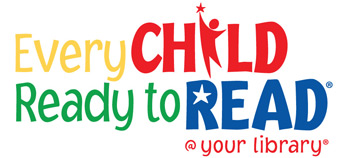ECRR & ECRR 2
What are they and how do they differ?
 Every Child Ready to Read @ your library, 1st edition (ECRR) was developed in 2001 by researchers in the field of early literacy as a model program for public libraries to use with parents and caregivers. The premise of these research-based materials was to encourage parents and caregivers to become involved in preparing their children to learn to read. A series of workshops, centered on three phases of early literacy development: pre-talkers, talkers and pre-readers, provided a structure for librarians to deliver training. Pilot testing sites and an independent outcomes evaluation facilitated the growth of this outreach initiative throughout the country.
Every Child Ready to Read @ your library, 1st edition (ECRR) was developed in 2001 by researchers in the field of early literacy as a model program for public libraries to use with parents and caregivers. The premise of these research-based materials was to encourage parents and caregivers to become involved in preparing their children to learn to read. A series of workshops, centered on three phases of early literacy development: pre-talkers, talkers and pre-readers, provided a structure for librarians to deliver training. Pilot testing sites and an independent outcomes evaluation facilitated the growth of this outreach initiative throughout the country.
In 2009, Dr. Susan Neuman and Dr. Donna Celano were commissioned by a joint ALSC/PLA task force to evaluate ECRR, conduct a literature review of early literacy research since the initial ECRR development, and make recommendations about updating the workshops. This evaluation project resulted in the development of Every Child Ready to Read @ your library, 2nd edition (ECRR 2).
The first edition of ECRR was based on the six early literacy areas of narrative skills, print motivation, phonological awareness, letter knowledge, print awareness, and vocabulary. The workshops were heavily scripted and emphasized educational terms. The second edition incorporates strategies for developing these six skills into workshops centered on the five early literacy practices of talking, singing, reading, writing and playing. The workshops do not place an emphasis on educational terms in the hope that this will make the content more accessible to parents and caregivers. They do, however, delineate the differences between two areas of early skill development: skills needed for decoding, or learning to read the printed word, and skills needed for comprehension, or understanding what is read. The workshops make the point that comprehension skills continue to develop throughout a student's school career and are the most important to later success in reading.
We have provided a detailed overview of the six skill areas reflecting the research of ECRR 2 and the five practices of the second edition.
See Six Early Skills and Five Early Literacy Practices.
